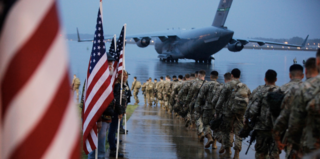Fear
Longing for War
"Fear of Missing Out" can affect veterans, too.
Posted January 9, 2020 Reviewed by Matt Huston
Last week, when the news broke regarding the 82nd Airborne Division rapidly deploying to the Middle East, I was with two active-duty officers, both of whom formerly served in the 82nd Airborne. As the news alerts chimed on their phones, and text messages rolled in from friends still in their old units, an avalanche of feelings began to spill out of them.
Sadness. Fear. Love. Anger. Frustration. Regret.
Perhaps I should clarify, those two officers are my little brother and my husband, both married and fathers of two young children. We were all together on vacation, and yet part of them wished they were drawing weapons and stepping on the planes headed to the Middle East.
Make no mistake, they were not cheering for bloodshed or necessarily in support of the possibility of war, but if their soldiers were going, they wanted to go, too. It’s both that simple and extraordinarily complex.
What it doesn’t make of them, or those who feel similarly, is war-mongers, psychopaths, atypical, or suicidal—they no more want to die than the rest of us, nor does it mean they love their loved ones any less.
The conflict they feel is all too common for active-duty service members who feel sidelined in the fight by virtue of deployment schedules or unit assignments—or veterans who feel out of it completely.
War is a great many things and, for better or worse, it brings out the most human parts of us. The most intense bits of that humanity are the need to be tested and not found wanting, a sense of belonging, and purpose.

The image of the soldiers marching towards the aircraft to threats unknown is a manifestation of that triad.
The reality is you can miss war and hate it. It’s not clear cut or neatly done. Some would say you feel the most alive when you are the closest to death, and even the boredom is more profound. It’s a deeper, rawer kind of living, so much so that after an average life can feel, well, average. A former Marine reconnaissance-man once joked that “PTSD is the realization you will never be that cool again.”
Watching others do what you once did is also a concrete reminder that you are no longer the person you once were. For those who are struggling in the transition to civilian life, there is the potential for increased burden around the reconciliation of one's past self with one's current self. The integration of those parts of yourself is profound and made more difficult when the fear of missing out is triggered by real-world events.
Yes, FOMO, the fear of missing out; it has become a punchline, but for many, its psychological impact is anything but.
The fear of missing out is quintessentially human and for some, not deploying or deploying and not being engaged by the enemy is missing out in a big way. It's the personification of “no joy,” military jargon for when an attempt to acquire a target is unsuccessful.
Deployments are complicated, with experiences that can be damaging and rewarding. The fear of missing out is characterized by regret and anxiety that others might be having rewarding experiences without you. Left unchecked it can perpetuate the belief that you have somehow made a wrong decision—in this case, the decision to leave the military or pursue other options.
Others have argued that the fear of missing out is best viewed through the lens of self-determination theory, which asserts that interpersonal, human connectedness is a psychological need that impacts overall well-being. In that context, the fear of missing out is best understood as a “self-regulatory state arising from situational or long-term perception that one's needs are not being met.” In other words, those who most long to be with their brothers and sisters in harm’s way are quite possibly experiencing a deficit of human connectedness, a loss of bonds in their life.
It’s hard to overstate the power of the relationships you form in the military, particularly in combat. These bonds, which include a strong sense of responsibility for those around you, are purposefully cultivated during military training and reinforced in combat. Most often, when psychologists and other mental health providers speak about the loss of bonds, it’s solely in the context of death.
Yet the loss of a friend or comrade can also be experienced psychologically, such as by no longer feeling like an integral part of their life, or feeling that the connection you once shared no longer exists or is shared with someone else. This type of ambiguous grief can be more difficult to process because you've lost something intangible from a still-existing source. It's confusing for the head and heart to reconcile.
Taking such factors into consideration, we can begin to understand and contextualize a soldier’s longing for war. It has little to do with the ugly parts and everything to do with what often feels missing in our individualistic, materialistic, and easy-access culture. The worst thing we can do is a pathologize or criticize such expressions. Doing so reinforces how different they might be, alone they are, and out of place they feel.
“Combat isn't where you might die—though that does happen—it's where you find out whether you get to keep on living. Don't underestimate the power of that revelation. Don't underestimate the things young [people] will wager in order to play that game one more time.” —Sebastian Junger, War




